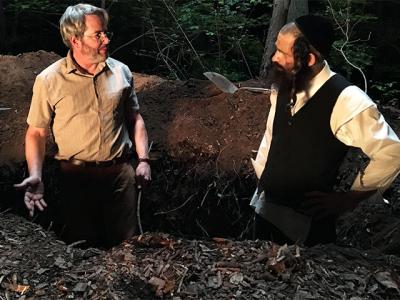It’s a Couples Thing at Tribeca

Placed in the mix of dramas, docs, shorts, and talks at the 2018 Tribeca Film Festival, which wrapped up on Sunday, were a couple of small film projects that involved some of the bolder-faced names of East Hampton.
One film, “To Dust” by Shawn Snyder, is a quirky, unsettling, and sometimes uproarious buddy movie starring Matthew Broderick, an Amagansett part-timer, and produced by the acting spouses Emily Mortimer and Alessandro Nivola, who also have a house in Amagansett. Fabien Constant’s “Blue Night” stars Mr. Broderick’s wife, Sarah Jessica Parker, making the festival a bit of a family affair.
Both films are departures for their stars, but in different ways. “To Dust” takes on the immense grief of Shmuel, a Hasidic cantor, for his wife, who has just died of cancer. Plagued by nightmares and fearing that her spirit is in pain, he seeks to understand how long it will take for her body to turn “to dust,” which will thereby free her soul.
As played by Geza Rohrig, a Hungarian actor, Shmuel and his behavior become the talk of his insular community. In order to seek the answers he needs, he goes outside of it, to absurd effect. He eventually walks into the Biology 101 class of Mr. Broderick, a gentile professor at a local community college, to find a more scientific explanation for the answers he seeks. The plot gets pretty Byzantine, and there are some quite foul moments that illustrate both factual and imagined decay, but the cockeyed camaraderie that these two very different people develop is, if not heartwarming, at least a bit touching in a very strange way.
In addition to winning the audience award for narrative film, Mr. Snyder, who is a first-time feature director, won Tribeca’s jury award for best new narrative director last Thursday. Josh Charles, Zosia Mamet, and Joshua Leonard served as this year’s jury for the award. “To Dust” also won an Alfred P. Sloan Foundation feature film award in 2015 for the role that forensic anthropology (the science of human decomposition) played in the plot.
Given the often extreme lengths the characters go to to resolve Shmuel’s question, Mr. Broderick and Mr. Rohrig are grounded and charming, despite their self-made and increasingly bizarre circumstances. The two actors are as realistic as possible, given their characters’ eccentricities. The bond that develops between them feels genuine. The rest of the cast, including Shmuel’s mother and two sons, are also affecting in their own grief and concern for their father.
Ms. Parker’s film also deals with themes of mortality. “Blue Night” takes us on her 24-hour journey after she receives a diagnosis of inoperable brain cancer. An aging chanteuse who has obviously faded in fame and acclaim despite what her manager and friends tell her, Ms. Parker is forced to face her life choices and how they have affected those she loves and who love her. Most of the film focuses on her attempts at connection. One of its key mysteries is whom she might choose to accompany her to the hospital the next day for a new battery of tests.
If the plot sounds familiar, that’s because it is loosely based on the 1962 Agnes Varda film “Cleo From 5 to 7.” Familiar faces populate it, including Common as her manager, Simon Baker as her ex, and Renee Zellweger as a friend she obviously has not seen in a while.
Ms. Parker sings two songs, a cover of “I Think We’re Alone Now,” which plays over the credits, and “Unfollow the Rules” by Rufus Wainwright (another East Hampton connection), which she sings in a club. While she can certainly carry a tune, her breathy delivery doesn’t really jibe with the dominance her character is purported to have in her genre.
It’s not clear what the fate of these films will be, but both would be worth seeing should they find distribution deals. “To Dust,” in particular, offers a fresh and truly unique vision. “Blue Night” allows fans of Ms. Parker to see her expand her range in acting and song.
